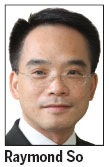Increasing the number of university places doesn't add up
Updated: 2013-07-25 06:55
By Raymond So(HK Edition)
|
|||||||

Chinese people, including those in Hong Kong, place strong emphasis on their children's education, with a general belief that it is very hard for young people to succeed in today's knowledge-based economy without a university degree.
Last week, the Hong Kong Examination and Assessment Authority released the 2013 Hong Kong Diploma of Secondary Education (DSE) examination results, indicating that about 28,000 high school graduates, or 37 percent of DSE examination candidates, scored the minimum entrance requirements for local universities. With only 12,000 government-funded university places available, some 16,000 candidates are not guaranteed a place in government-funded universities. This prompted many to suggest that government-funded university places should be increased to meet the demand.
This makes sense if we only look at the demand side. Nevertheless, if we look at the whole picture, we may have a second thought over this idea. University education in Hong Kong is not considered as social welfare which is available to all, but rather merit based. Achieving the minimum entrance requirements does not automatically guarantee a place in university. In addition, different departments and majors may set additional requirements. The rationale is that some studies have a higher requirement on languages, mathematics skills or other capabilities. In short, we cannot conclude that government-funded university places should be increased just because there are 28,000 qualified candidates.
Equally, we should also look at the supply side when assessing the need for university places. A government report submitted to the Legislative Council (LegCo) shows that there were 26,400 DSE candidates who met the minimum entrance requirements last year, versus 12,000 government-funded university places and 7,700 places offered by accredited self-financed tertiary institutions. Only 6,800 of those self-financed places were taken up, leaving nearly 1,000 places unfilled. This shows that there is not really a shortage of university places but a mismatch in supply and demand.
This observation suggests that many DSE candidates shun self-financed institutions for various reasons, the most obvious being concern over their quality. University education is expensive. For every government-funded undergraduate place, the government provides a subsidy of more than HK$200,000 per student per year. In addition, students need to pay HK$42,000 tuition fees. If we include other sorts of subsidies from endowment funds, donations and other sources, the actual annual cost of a government-funded undergraduate place is more than HK$260,000. This advantage in resources makes government-funded universities more attractive to students.
However, it is noteworthy that the city's declining fertility rate has led to the closure of many primary and secondary schools. According to official statistics, the number of DSE candidates will drop to around 46,000 in 10 years. If the percentage of qualified candidates remains at the current level, it is possible that all candidates who meet the minimum entrance requirements will secure a government-funded university place by then. The situation wherein many primary and secondary schools are forced to close down is likely to emerge again in the tertiary sector if we blindly increase university places now. It is a painful process to close down a school because not only students but the whole educational environment will be adversely affected. In short, it is easy to increase university places but difficult to scale down. Hence, the government is extremely careful in handling the request for an increase in government-funded university places.
One way to address the current situation is to increase government-funded university places with short-term measures. However, a problem could arise: the short-term measures will stay forever because of the higher expectation generated. Alternatively, the government can consider providing subsidies to self-financed institutions on a competitive and short-term basis. This idea is similar to the practice of buying places from private secondary schools. Of course, there were a lot of problems with the Bought Place Scheme (BPS) in secondary schools. However, the BPS did allow the provision of education to more young people. The problem lies on how to control education quality. The important point is that these subsidies are renewable annually. In this way, the government will have flexibility in providing more university places while exercising a form of control.
The author is dean of the School of Business at Hang Seng Management College.
(HK Edition 07/25/2013 page1)